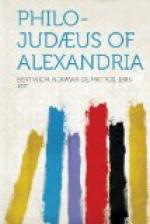original of God’s covenant, stamped with His
own seal, namely, the idea of Himself, as it were,
with the image of His Godhead” (iv); or, again,
“The supreme reward for keeping God’s Word
is that Word itself.” Spinoza knew no Greek,
but, master as he was of Christian theology, he may
have studied Philo in a Latin translation, and caught
some of his phrases. With or without influence,
he developed, as Philo had done, a system of philosophy,
starting from the Hebrew conception of God and blending
Jewish tradition with scientific metaphysics.
The Unity of God and His sole reality were the fundamental
principles of his thought, as they had been of Philo’s.
He rejected, indeed, with scorn the notion that all
philosophy must be deduced from the Bible, which was
to him a book of moral and religious worth, but free
from all philosophical doctrine. Theology, the
subject of the Bible, according to him, demands perfect
obedience, philosophy perfect knowledge.[345] Both
alike are saving, but the spheres of the two are distinct:
and Moses and the prophets excel in law and imagination,
not in reason and reflection. Hence Spinoza approached
the Bible from the critical standpoint; and, on the
other hand, he approached philosophy with a free mind
searching for truth, independent of religious dogmatism,
and he was, therefore, the founder of modern philosophy.
None the less his view of the universe is an intellectual
expression of the Hebraic monotheism, which unites
a religious with a scientific monism. He regards
God as the only reality, sees and knows all things
in Him, and deduces all things from His attributes,
which are the incomplete representations that man
makes of His true nature; he explains all thought,
all movement, and all that seems material as the working
of His modes; and, finally, he places as the end of
man’s intellectual progress and the culmination
of his moral life the love of God. In truth,
Jewish philosophy has its unity and its special stamp,
no less than Jewish religion and tradition, from which
it receives its nurture. Thrice it has towered
up in a great system: through Philo in the classical,
through Maimonides in the mediaeval, through Spinoza
in the modern world. In the Renaissance of Jewish
learning during the nineteenth century, Philo was
at last studied and interpreted by scholars of his
own people. The first modern writer to reveal
the philosophy of Jewish history was Nachman Krochmal
(1785-1840), and his posthumous Hebrew book, “The
Guide of the Perplexed of the Time,” edited by
Zunz, contained the first critical appreciation of
the Hellenistic Jewish culture by a rabbinic scholar.
He knew no Greek, but he studied the works of German
writers, and in his account of Philo gives a summary
of the remarks of the theologian Neander, himself a
baptized Jew. In his own criticism he discerns
the weakness and strength of Philo from the Jewish
aspect. “There are,” he says, “many
strange things in Philo’s exegesis, not only
because he draws far-fetched allegories from the text,
but also because he interprets single words without
a sure foundation in Hebrew philology. He uses
Scripture as a sort of clay which he moulds to convey
his philosophical ideas. Yet we must be grateful
to him because many of his interpretations are beautiful
ornaments to the text; and we may apply to them what
Ibn Ezra said of the teachings of the Haggadah, ’Some
of them are fine silks, others as heavy as sack-cloth.’”




